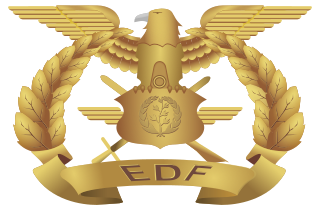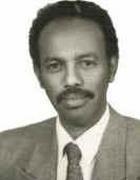Related Research Articles

The Politics of Eritrea and the Government of Eritrea takes place in a framework of a single-party presidential republican totalitarian dictatorship. The President officially serves as both head of state and head of government. The People's Front for Democracy and Justice is the only political party legally permitted to exist in Eritrea. The popularly elected National Assembly of 150 seats, formed in 1993 shortly after independence from Ethiopia, elected the current president, Isaias Afwerki. There have been no general elections since its official independence in 1993. A new constitution was drafted in 1993 and ratified in 1997, but has not been implemented. Since the National Assembly last met in January 2002, President Isaias Afwerki has exercised the powers of both the executive and legislative branches of government.

The Eritrean Defence Forces (EDF) are the combined military forces of Eritrea composed of three branches: Eritrean Army, Eritrean Air Force and Eritrean Navy. The Army is by far the largest, followed by the Air Force and Navy. The Commander-in-Chief of the EDF is the President of Eritrea. Their military role stems from Eritrea's strategic geographical location, located on the Red Sea with a foothold on the Bab-el-Mandeb strait.

Isaias Afwerki is an Eritrean politician and partisan who has been the president of Eritrea since shortly after he led the Eritrean People's Liberation Front (EPLF) to victory in 24 May 1991, ending the 30-year-old war for independence from Ethiopia.

The People's Front for Democracy and Justice is the founding, ruling, and sole legal political party of the State of Eritrea. The successor to the Marxist–Leninist Eritrean People's Liberation Front (EPLF), the PFDJ regards itself as a left-wing nationalist party, though it holds itself open to nationalists of any political affiliation. The leader of the PFDJ party and current President of Eritrea is Isaias Afwerki. It has been described as totalitarian.

The Eritrean People's Liberation Front (EPLF), colloquially known as Shabia, was an armed Marxist–Leninist organization that fought for the independence of Eritrea from Ethiopia. It emerged in 1970 as a far-left to left-wing nationalist group that split from the Eritrean Liberation Front (ELF). After achieving Eritrean independence in 1991, it transformed into the People's Front for Democracy and Justice (PFDJ), which serves as Eritrea's sole legal political party.
G-15 is a name given to a group in Eritrea that opposes the policy of President Isaias Afewerki postponing elections and the failure in implementing the constitution. The membership of this group consists of former members of the President's ruling People's Front for Democracy and Justice (PFDJ) which has ruled the country since its independence in 1993. In May 2001 the group issued an open letter raising criticism against Isayas Afeworki's actions calling them "illegal and unconstitutional."

The National Assembly of the State of Eritrea has 150 members, 75 members appointed and 75 members representing the members of the Central Committee of the People's Front for Democracy and Justice (PFDJ), the sole legal political party of Eritrea. According to the IPU, the National Assembly has 150 indirectly elected members. The National Assembly was composed in 1994, and its meeting place is located in Asmara.
Mahmoud Ahmed Sherifo, commonly known simply as Sherifo, is an Eritrean politician. He joined the Eritrean Liberation Front in 1967. He was an independent activist during Eritrea's war of independence from Ethiopia. Post-independence, he served in various capacities as Minister of Foreign Affairs and Minister of Local Government.

Helen Berhane is an Eritrean Christian Gospel singer who was a prisoner in Eritrea.

Petros Solomon is an Eritrean politician. He was an Eritrean People's Liberation Front commander during the Eritrean War of Independence, and following independence he served in several positions in the Cabinet, including Minister of Defense and Minister of Foreign Affairs. He has been in prison, held incommunicado in an undisclosed location, since September 18, 2001 for opposing the rule of Eritrean president Isaias Afewerki. Amnesty International has named him a prisoner of conscience.
Ogbe Abraha is an Eritrean politician. He joined the Eritrean People's Liberation Front (EPLF) in 1972 and, since independence, has held the following positions: member of the Central Council of the People's Front for Democracy and Justice (PFDJ), member of the National Council, Secretary and then Minister of Trade and Industry, Minister of Labour and Social Welfare, Chief of Logistics, Administration and Health in the Ministry of Defence, Chief of Staff of the Eritrean Defence Forces. Abraha was dismissed from his post and stripped of his military rank by the President in February 2000. He was arrested in September 2001 due to his membership of the G-15 group of ministers calling for political reforms. He has been held incommunicado since that time. He was reported to be suffering from asthma.
Mesfin Hagos is an Eritrean who was one of the founding members of the Eritrean People's Liberation Front (EPLF). In government, he was the Eritrean Minister of Defense during the 1990s. After repression by president Isaias Afwerki against Mesfin's colleagues, Mesfin sought political asylum in Germany in 2013, where he lived as of December 2020.
Haile Woldense or Woldetensae is an Eritrean politician.
Alamin Mohammed Seid was an Eritrean politician.

Eritrean Islamic Jihad, also referred to as the Eritrean Islamic Salvation Movement, Eritrean Islamic Jihad Movement, and/or Harakat al Jihad al Islami al Eritrea. The Eritrean Islamic Jihad Movement (ERIJ), is one of several opposition groups that operates in Eritrea and from surrounding countries.
Seyoum Tsehaye is a jailed Eritrean journalist. At independence in 1993, Tsehaye was named to the head of Eri-TV, the Eritrean state broadcaster. He was arrested in September 2001 when President Isaias Afewerki closed all non-governmental media sources. In December 2007, Seyoum was named Reporter of the Year by Reporters Without Borders. As of January 2016, he was known to be alive, being held at Eiraeiro prison.
Ruth Simon is an Eritrean journalist.
Aster Yohannes is a veteran of Eritrean People's Liberation Front (EPLF) and an independence activist. Post-independence, she was working in the ministry of Fishery and Marine Resources in 1995. She also is the wife of detained Eritrean politician Petros Solomon.
Eiraeiro is a secret prison in Eritrea. Most sources give the location of Eiraeiro as being situated near the village of Gahtelay, in the Northern Red Sea Region. However, in an article in the Guardian, Eiraeiro is cited as being located approximately 10 miles from the capital, Asmara.
Events in the year 1994 in Eritrea.
References
- 1 2 3 Glenys Kinnock (28 February 2008). "It could have been me". New Statesman. Archived from the original on 3 October 2009. Retrieved 13 July 2012.
- ↑ Connell, Dan; Killion, Tom (2010). Historical Dictionary of Eritrea. Scarecrow Press. p. 421. ISBN 9780810875050.
- 1 2 "Eritrea: Prisoners of conscience held for a decade must be released". Amnesty International. 15 September 2011. Archived from the original on 3 December 2011. Retrieved 26 December 2011.
- ↑ "Eritrean Leaders Held Incommunicado for a Decade". All Africa. 15 September 2011. Archived from the original on 28 December 2011. Retrieved 26 December 2011.
- ↑ "Eritrea urged to free dissident Aster Fissehatsion". BBC. 15 September 2011. Archived from the original on 13 November 2016. Retrieved 26 December 2011.